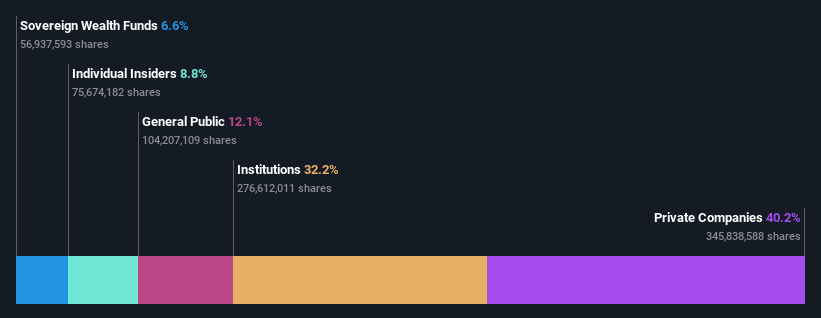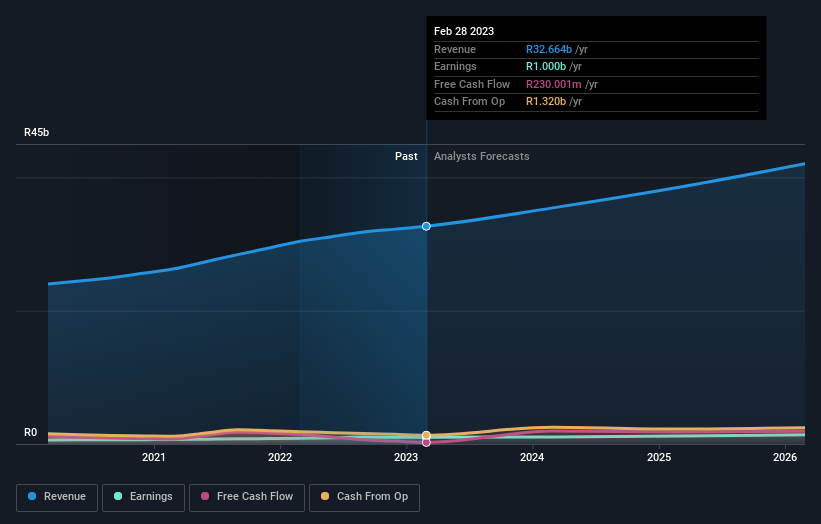Stock Analysis
- South Africa
- /
- Food and Staples Retail
- /
- JSE:DCP
Dis-Chem Pharmacies Limited's (JSE:DCP) market cap dropped R1.2b last week; individual investors who hold 40% were hit as were institutions

Key Insights
- Significant control over Dis-Chem Pharmacies by private companies implies that the general public has more power to influence management and governance-related decisions
- 51% of the business is held by the top 2 shareholders
- Insiders have sold recently
Every investor in Dis-Chem Pharmacies Limited (JSE:DCP) should be aware of the most powerful shareholder groups. With 40% stake, private companies possess the maximum shares in the company. That is, the group stands to benefit the most if the stock rises (or lose the most if there is a downturn).
While institutions who own 32% came under pressure after market cap dropped to R19b last week,private companies took the most losses.
In the chart below, we zoom in on the different ownership groups of Dis-Chem Pharmacies.
View our latest analysis for Dis-Chem Pharmacies

What Does The Institutional Ownership Tell Us About Dis-Chem Pharmacies?
Many institutions measure their performance against an index that approximates the local market. So they usually pay more attention to companies that are included in major indices.
Dis-Chem Pharmacies already has institutions on the share registry. Indeed, they own a respectable stake in the company. This suggests some credibility amongst professional investors. But we can't rely on that fact alone since institutions make bad investments sometimes, just like everyone does. It is not uncommon to see a big share price drop if two large institutional investors try to sell out of a stock at the same time. So it is worth checking the past earnings trajectory of Dis-Chem Pharmacies, (below). Of course, keep in mind that there are other factors to consider, too.

We note that hedge funds don't have a meaningful investment in Dis-Chem Pharmacies. Saltzman Family Trust is currently the largest shareholder, with 35% of shares outstanding. In comparison, the second and third largest shareholders hold about 15% and 11% of the stock. In addition, we found that Rui Morais, the CEO has 1.0% of the shares allocated to their name.
A more detailed study of the shareholder registry showed us that 2 of the top shareholders have a considerable amount of ownership in the company, via their 51% stake.
Researching institutional ownership is a good way to gauge and filter a stock's expected performance. The same can be achieved by studying analyst sentiments. There are a reasonable number of analysts covering the stock, so it might be useful to find out their aggregate view on the future.
Insider Ownership Of Dis-Chem Pharmacies
The definition of an insider can differ slightly between different countries, but members of the board of directors always count. Company management run the business, but the CEO will answer to the board, even if he or she is a member of it.
Most consider insider ownership a positive because it can indicate the board is well aligned with other shareholders. However, on some occasions too much power is concentrated within this group.
Shareholders would probably be interested to learn that insiders own shares in Dis-Chem Pharmacies Limited. It is a pretty big company, so it is generally a positive to see some potentially meaningful alignment. In this case, they own around R1.7b worth of shares (at current prices). If you would like to explore the question of insider alignment, you can click here to see if insiders have been buying or selling.
General Public Ownership
The general public, who are usually individual investors, hold a 12% stake in Dis-Chem Pharmacies. While this group can't necessarily call the shots, it can certainly have a real influence on how the company is run.
Private Company Ownership
It seems that Private Companies own 40%, of the Dis-Chem Pharmacies stock. Private companies may be related parties. Sometimes insiders have an interest in a public company through a holding in a private company, rather than in their own capacity as an individual. While it's hard to draw any broad stroke conclusions, it is worth noting as an area for further research.
Next Steps:
I find it very interesting to look at who exactly owns a company. But to truly gain insight, we need to consider other information, too.
I always like to check for a history of revenue growth. You can too, by accessing this free chart of historic revenue and earnings in this detailed graph.
If you are like me, you may want to think about whether this company will grow or shrink. Luckily, you can check this free report showing analyst forecasts for its future.
NB: Figures in this article are calculated using data from the last twelve months, which refer to the 12-month period ending on the last date of the month the financial statement is dated. This may not be consistent with full year annual report figures.
New: Manage All Your Stock Portfolios in One Place
We've created the ultimate portfolio companion for stock investors, and it's free.
• Connect an unlimited number of Portfolios and see your total in one currency
• Be alerted to new Warning Signs or Risks via email or mobile
• Track the Fair Value of your stocks
Have feedback on this article? Concerned about the content? Get in touch with us directly. Alternatively, email editorial-team (at) simplywallst.com.
This article by Simply Wall St is general in nature. We provide commentary based on historical data and analyst forecasts only using an unbiased methodology and our articles are not intended to be financial advice. It does not constitute a recommendation to buy or sell any stock, and does not take account of your objectives, or your financial situation. We aim to bring you long-term focused analysis driven by fundamental data. Note that our analysis may not factor in the latest price-sensitive company announcements or qualitative material. Simply Wall St has no position in any stocks mentioned.
About JSE:DCP
Dis-Chem Pharmacies
Engages in the retail and wholesale of healthcare products and pharmaceuticals in South Africa.
Flawless balance sheet with moderate growth potential.

